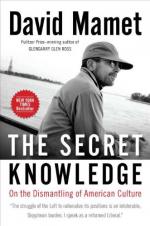
|
| Name: _________________________ | Period: ___________________ |
This test consists of 15 multiple choice questions and 5 short answer questions.
Multiple Choice Questions
1. What book did David Mamet write about filmmaking?
(a) On Directing Film.
(b) Directing the Future.
(c) All About Film and Filmmaking.
(d) Films for Dummies.
2. What word means to speak damagingly of; criticize in a derogatory manner; sully; defame?
(a) Praise.
(b) Denigrate.
(c) Critique.
(d) Abolish.
3. Mamet writes that marriage is a naturally evolved response to the primordial urge for what?
(a) Religion.
(b) Finance.
(c) Monogamy.
(d) Biological urges.
4. The main effects of the decision in Dred Scott v. Sandford in history were the rise of the Republican Party over what party?
(a) The Green Party.
(b) The Whig Party.
(c) The Democratic Party.
(d) The Torey Party.
5. In Chapter 38: Who Does One Think He Is? Mamet claims that he wrote "The Secret Knowledge" not because he's an expert but because he is what?
(a) A true patriot.
(b) A citizen with something to say.
(c) Lacking listeners.
(d) Saddened by the state of the country.
6. What is a way the government generates revenues and which are based on proportions of earnings which is considered fair, according to Mamet?
(a) Laws.
(b) Charities.
(c) Taxes.
(d) Embargoes.
7. When did the Vietnam War begin?
(a) 1949.
(b) 1965.
(c) 1955.
(d) 1962.
8. Where was Karl Marx born?
(a) Madrid, Spain.
(b) London, England.
(c) Prague, Czech Republic.
(d) Trier, Kingdom of Prussia.
9. What was a federation of unions that organized workers in industrial unions in the United States and Canada from 1935 to 1955?
(a) The Teamsters.
(b) The Society of Workers.
(c) The Congress of Industrial Organizations.
(d) The Federation of North American Workers.
10. Mamet claims in Chapter 35: The Small Refrigerator, that the biggest fault of his generation is what?
(a) Pride.
(b) Ingratitude.
(c) Intelligence.
(d) Anger.
11. In 1969, Al Sharpton was appointed by whom as youth director of Operation Breadbasket, a group that focused on the promotion of new and better jobs for African-Americans?
(a) John F. Kennedy.
(b) Richard Nixon.
(c) Franklin D. Roosevelt.
(d) Jesse Jackson.
12. Mamet writes in Chapter 33: Self-Evident Truth that our nation has been the most successful in history because our laws are built upon the concept that compassion and greed in the hands of the state will result in what?
(a) Misery.
(b) Classes.
(c) Bliss.
(d) Fueding.
13. In 1987, Mamet made his film directing debut with what movie?
(a) Signs of Sorrow.
(b) City of Angels.
(c) House of Games.
(d) Field of Flowers.
14. According to Mamet in Chapter 29: The Family, liberal universities mislead students by teaching them that society is susceptible to what?
(a) Love.
(b) Justice.
(c) Anxiety.
(d) Reason.
15. What is defined as an organized group of persons associated together for religious, benevolent, cultural, scientific, political, patriotic, or other purposes?
(a) Society.
(b) Cult.
(c) Postmodernism.
(d) Multiculturalism.
Short Answer Questions
1. According to David Mamet, Al Sharpton complains about hair salons in black communities being owned largely by whom?
2. What location does Mamet describe as similar to the Catskills and was a playground for adult Jews who were restricted from other hotels and resorts?
3. What does Mamet define as when government vows to lead the people to the Promised Land in Chapter 33: Self-Evident Truth?
4. What book is Karl Marx most well-known for writing?
5. What is defined as the quality in a person or society that arises from a concern for what is regarded as excellent in arts, letters, manners, scholarly pursuits, etc.?
|
This section contains 530 words (approx. 2 pages at 300 words per page) |

|




